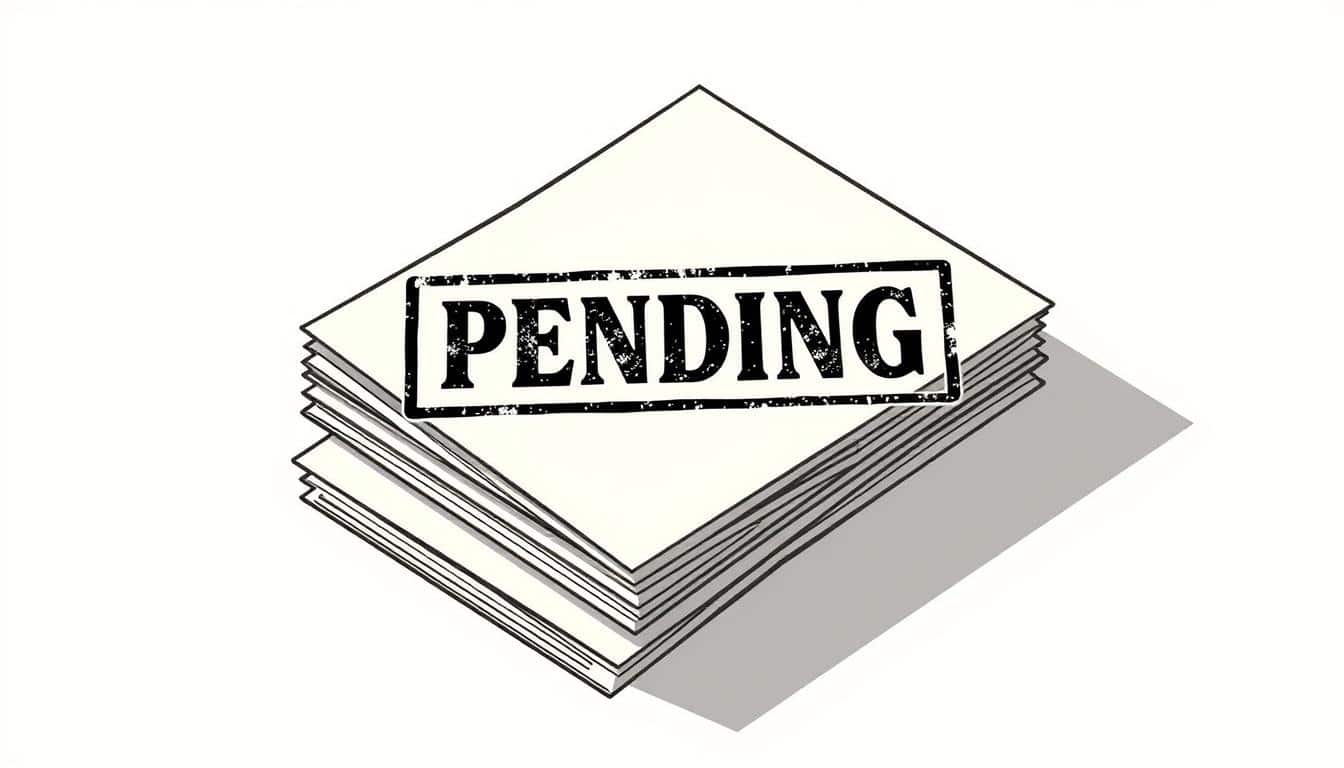Understanding the real estate market can be tricky. A pending real estate transaction is a key part of buying a home. When a property is pending, it means the seller has agreed to an offer. But the deal is not yet done.
At Babcock Ranch Homes, we guide buyers and sellers through this. The pending status shows a property is moving from being listed to possibly sold. It means the deal is in progress but not finished.
Homebuyers need to know that a pending status involves several steps. These include talking over the contract, doing home inspections, getting financing, and meeting conditions. Only then can the sale be finalized.
Key Takeaways
- Pending status means a seller has accepted an offer
- The property is temporarily removed from active market listings
- Multiple steps remain before the final sale closes
- Financing and inspections can impact the deal
- Backup offers are possible during pending status
Understanding Real Estate Status: What Does Pending Mean in Real Estate
Exploring the real estate market can be tricky, with many property statuses to understand. The pending status in real estate is a key step in the home buying journey. It shows the sale is moving closer to completion.

When a property is contract pending in real estate, it means the seller has agreed to an offer. Both sides are working towards closing the deal. This time is both thrilling and sensitive, with several important factors affecting the sale’s success.
Defining Pending Status
A pending status means:
- An offer has been accepted by the seller
- A purchase contract has been signed
- The property is no longer actively marketed
- Contingencies are being processed
Key Components of Pending Status
The pending phase includes several essential steps:
- Initial contract negotiations are complete
- The buyer’s mortgage is pre-approved
- The home inspection is done
- The appraisal is verified
Legal Implications of Pending Status
During the pending phase, both buyers and sellers have legal duties. The contract is legally binding, stopping the seller from accepting other offers.
Homes are typically pending for 30-60 days before the sale is finalized.
| Status Stage | Duration | Primary Activities |
|---|---|---|
| Initial Pending | 1-2 weeks | Contract review, initial contingencies |
| Mid Pending | 2-4 weeks | Home inspection, appraisal |
| Final Pending | 1-2 weeks | Mortgage finalization, closing preparation |
Knowing about the pending status helps buyers and sellers feel more confident and clear in the real estate world.
The Difference Between Pending and Contingent Status
Understanding real estate can be tricky, with terms like contingent and pending. These terms might seem alike, but they mark different steps in a home sale.
A contingent status means an offer is accepted, but conditions must be met first. This gives both sides a safety net.
- Contingent Status: Offer accepted with outstanding conditions
- Pending Status: Most or all contingencies have been satisfied
Real estate deals often have several contingencies. These include:
- Financing contingency
- Home inspection contingency
- Appraisal contingency
- Home sale contingency
- Title contingency
The National Association of Realtors says about 6% of deals fall through between March and May 2022. This shows why knowing about property statuses is key.
A property’s status directly impacts buyers’ chances and plans.
Buyers looking at contingent or pending properties should stay open-minded. A contingent property might accept other offers, but a pending one is closer to closing.
How a Property Becomes Pending in Real Estate
Turning a property from an active listing to a sale involves key steps. This process helps both buyers and sellers know what to expect. It’s all about managing hopes and expectations.
The path to pending starts with talks between buyers and sellers. Usually, homes stay in this phase for 2-6 weeks. The time it takes depends on the specific conditions.
Initial Offer and Acceptance
Buyers must show they’re serious when making an offer. They do this by:
- Offering a competitive price
- Putting down a 3% earnest money deposit
- Proposing terms that benefit the seller
“A strong initial offer increases the likelihood of moving quickly to pending status”
Contract Negotiation Process
Negotiation is key for a successful pending sale. Buyers and sellers need to agree on:
- The purchase price
- Contingency terms
- Any repair issues
Moving from Active to Pending
Meeting certain conditions is necessary for the transition. About 1 in 3 buyers might change their mind before closing. This could mean losing their earnest money deposit. Sellers often prefer offers with fewer conditions to speed up the sale.
Being financially ready is also important. Lenders have strict credit requirements. Buyers must keep their finances stable during the sale.
In 2023, only 5% of home sale contracts fell through. This shows the real estate market is relatively stable for pending deals.
Types of Pending Statuses in Real Estate

Pending listings in real estate have different statuses. These statuses give important insights into the home sale process. Knowing these statuses helps buyers and sellers move through the real estate market better.
Real estate experts see several pending home sale categories. Each category shows a different stage of the deal:
- Pending – Taking Backups: Seller keeps accepting backup offers
- Pending – Release: All conditions are met, closing is near
- Pending – Short Sale: Needs extra lender approval
- Pending – No Show: Closing looks likely
- Pending – Contingent: Waiting for certain conditions
Each pending status marks a unique part of the real estate deal. For example, Pending – Taking Backups means a main offer is in place but the seller is open to other offers. This status could be a chance for more buyers to get involved.
| Pending Status | Characteristics | Buyer Opportunities |
|---|---|---|
| Taking Backups | Primary offer accepted | Can submit backup offer |
| Release | Contingencies completed | Limited opportunities |
| Short Sale | Lender approval pending | Potential negotiation |
About 3-5% of pending sales don’t go through. Most pending sales last 30 to 60 days. When everything goes smoothly, deals usually close in one month.
Buyers and sellers need to team up with real estate pros. They can help understand the details of these statuses. This way, they can handle the real estate deal’s complexities better.
The Role of Escrow in Pending Real Estate Transactions
Escrow is key in real estate deals, acting as a middleman to protect both sides. It’s vital when a property is pending, ensuring a safe and smooth sale.

The escrow process in a pending real estate transaction involves several key steps that safeguard the interests of all parties involved. During this phase, critical financial and legal elements are carefully managed to complete the property sale.
Escrow Process Overview
A typical escrow pending in real estate follows a structured approach:
- Opening an escrow account with a neutral third-party provider
- Depositing earnest money from the buyer
- Collecting and verifying required documentation
- Managing fund transfers
- Ensuring all contract conditions are met
Required Documentation
For a successful pending real estate transaction, several critical documents must be prepared and verified:
- Purchase agreement
- Property title reports
- Mortgage documents
- Insurance policies
- Closing statements
Timeline Expectations
The escrow period usually lasts 30 to 60 days. In this time, several things are checked, like:
- Home inspections
- Financing approval
- Property appraisal
- Title verification
Every real estate deal is different, with timelines changing based on the property and agreements. Knowing the escrow process helps buyers and sellers feel more confident during this important time.
Common Contingencies in Pending Real Estate Deals

Contingencies in real estate are key safeguards for both buyers and sellers. They let parties back out or change terms if certain conditions aren’t met.
Looking into pending real estate deals, we find several important contingencies:
- Financing Contingency: Protects buyers if mortgage approval fails
- Inspection Contingency: Allows buyers to check the property’s condition
- Appraisal Contingency: Makes sure the property’s value matches the price
- Title Contingency: Confirms the property is owned clear
- Home Sale Contingency: Gives buyers time to sell their current home
Financing contingencies are in about 80% of deals. Inspection and appraisal contingencies cover 75% and 70% of sales, respectively.
Knowing about these contingencies helps buyers make smart choices and avoid risks in real estate.
Sellers should know that 20-30% of deals might not go through because of unresolved issues. Good negotiation and clear talks can help avoid problems.
Duration of Pending Status: What to Expect
Knowing how long a home sale is pending can make the real estate process easier. The time it takes for a home sale to be pending can change based on many factors. This makes the process complex but doable.
A typical pending home sale usually lasts 30 to 60 days. This time is needed for important steps in the sale. It ensures everything is checked and balanced.
Typical Timeline Breakdown
- Initial conditional period: 5-14 days
- Mortgage processing: 2-4 weeks
- Final documentation and closing: 1-2 weeks
Factors Impacting Pending Sale Duration
Several key elements can influence the length of a pending home sale:
- Financing type: Cash purchases tend to close faster
- Inspection results: Possible repair negotiations
- Appraisal outcomes: Ensuring the value matches the sale price
- Mortgage approval process: Pre-approval speeds up the transaction
Pro tip: A pre-approved mortgage can greatly reduce delays in your real estate pending sale.
While most pending sales go smoothly, challenges can arise. Buyers and sellers should stay flexible and ready for surprises during this key time.
Can You Make an Offer on a Pending Property?

Dealing with pending listings in real estate can be tough for buyers. When a property is pending, the seller has accepted an offer, but the deal isn’t done yet. Even so, buyers can try to get their dream home.
One way to get a pending property is through a backup offer. Real estate agents can help buyers make these offers. They become active if the current deal falls apart.
- Backup offers stay valid while the pending sale is being finalized
- Sellers might look at backup offers if the first deal doesn’t work out
- About 4% of pending home sales don’t close
Buyers should know the rules when making backup offers. In places like California, you can’t just outbid the current buyer. Sellers can’t cancel a deal just because of a better offer.
| Backup Offer Considerations | Potential Outcomes |
|---|---|
| Financing Contingencies | Buyers have 50 days to get their financing |
| Inspection Issues | Big problems found during inspection can kill the deal |
| Legal Restrictions | Seller is stuck with the original contract terms |
Real estate pros say to be patient with pending listings. While backup offers are a chance, success depends on many things. This includes the original buyer’s financing, inspection results, and the contract details.
Understanding Backup Offers During Pending Status
Dealing with a pending real estate transaction can be tricky. This is true when your dream home is already under contract. Backup offers are a smart move for buyers who want a property that seems hard to get.
In competitive real estate markets, backup offers are a big chance for buyers. About 20-30% of deals in progress might not work out. This opens a door for those with backup offers.
Benefits of Backup Offers
Backup offers have many good points:
- They give you a better shot at getting the property you want.
- They can give you an edge in tough markets.
- They don’t cost you anything upfront.
- They let you be first in line if the main deal falls apart.
“A backup offer can be your strategic ticket to acquiring a property that initially seemed unavailable.”
How to Submit a Backup Offer
To make a strong backup offer, you need a good plan. Buyers should aim to make an offer that really stands out.
- Find out about the property’s current pending status.
- Make an offer that’s competitive but also realistic.
- Try to have fewer conditions.
- Show you’re financially solid.
- Get help from a real estate expert.
There’s a 10-15% chance you’ll get the property if the main deal doesn’t go through. Being patient and ready is important in using backup offer strategies.
Why Pending Sales Sometimes Fall Through

Pending real estate deals can hit unexpected roadblocks. While most sales go through, about 5% of offers fall apart before closing.
Several key factors can stop a pending sale:
- Financing complications
- Unexpected home inspection findings
- Appraisal value discrepancies
- Title search problems
- Buyer’s inability to sell existing property
Financing issues are the biggest threat. Mortgage approval challenges can pop up, hitting first-time buyers hard. Lenders might turn down loans due to credit score drops, job changes, or missing documents.
Home inspections can reveal major problems. Issues like structural damage, termite infestations, or needed repairs can make buyers back out. About 42% of buyers cancel deals after finding big inspection issues.
Appraisal values can also be a big hurdle. If a home appraises lower than the sale price, buyers might not get the financing they need. This problem affects about 6% of pending deals.
Issues with the title can also stop a sale. Problems like outstanding liens, ownership disputes, or missing property records can block the sale.
Navigating these challenges requires thorough preparation and professional guidance.
Emotions play a part too. About 20% of canceled deals are due to buyer financial worries. And 41% are because of changing interest rates.
The Home Inspection’s Role in Pending Status
Home inspections are key in pending home sales. They can decide if a deal goes through. Buyers check the property’s condition and find any problems.

About 15% of deals hit a snag because of what inspectors find. These detailed checks can change the course of a sale.
Critical Inspection Points
Inspectors look at important areas:
- Structural integrity of the building
- Electrical system functionality
- Plumbing and water systems
- HVAC performance
- Roof and foundation condition
- Potential pest or moisture damage
Negotiating Repairs
When big problems are found, buyers and sellers must talk it out. About 25% of buyers might back out if they find major flaws.
| Inspection Outcome | Potential Actions | Probability |
|---|---|---|
| Minor Issues | Request small repairs or credits | 55% |
| Moderate Problems | Negotiate price reduction | 30% |
| Major Defects | Potential contract termination | 15% |
Good talks during the sale phase are key. Buyers should focus on safety and structure, not looks.
Clear talks during home inspections can cut down on problems by up to 20%.
Financing Considerations During Pending Period

When you’re in the middle of a real estate deal, managing your money is key. You need to stay financially stable to make sure you get the property. This is important during the pending stage.
Here are some financial tips for the pending period:
- Keep your income steady and your job secure
- Don’t make big purchases on credit
- Work on keeping your credit score good
- Always be ready to show your financial documents
Getting a mortgage is a big part of buying a home. About 15% of deals fall apart because of money issues. Lenders really check your finances during this time.
Here are some key things to watch with your mortgage:
- Job stability: Having a steady job is essential
- Credit health: Try not to get new credit
- Debt-to-income ratio: Keep your finances in good shape
- Appraisal requirements: Make sure the property value is right for the loan
The National Association of Realtors says 6% of deals don’t make it past the pending stage. Money problems are a big reason. Working with your mortgage expert can help avoid these issues.
Being smart with your money can really help you close your real estate deal.
Rights and Obligations of Buyers and Sellers
A pending property sale has complex legal duties for both buyers and sellers. During the contract pending phase, each must know their specific duties for a smooth deal. The purchase agreement is a binding document that outlines what’s expected and the possible outcomes for both sides.
Buyers have several key duties during a pending sale. They must keep their financial status stable, get mortgage approval, and finish inspections on time. The agreement protects sellers, stopping buyers from backing out without a good reason. Buyers also need to put down earnest money and show they can afford the deal.
Sellers have important duties too. They must keep the property in the agreed condition, fix any maintenance issues, and prepare for a clean title transfer. Once the contract is pending, sellers can’t accept other offers, committing to the current buyer. They must also reveal any known property defects and help solve any inspection issues that come up.
Both sides face risks during the pending sale. Not meeting their duties can lead to penalties or legal trouble. With a 20 to 30 day average sale timeline, clear communication and managing duties well are key to a successful deal.




















